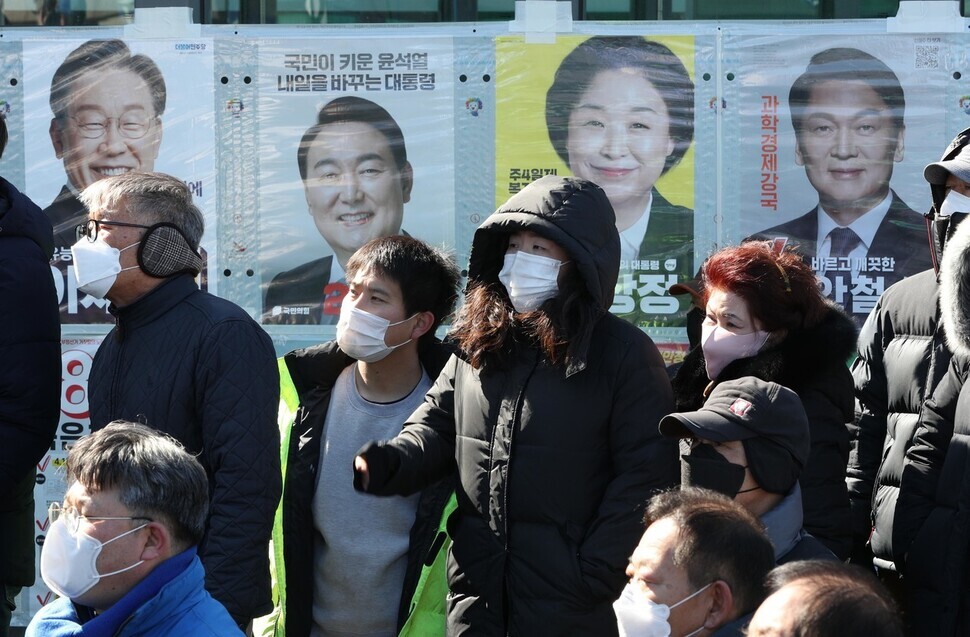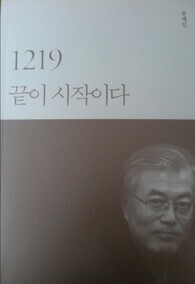hankyoreh
Links to other country sites 다른 나라 사이트 링크
Desperation and identity: The 2 factors that will decide S. Korea’s presidential election

The candidates in this year’s South Korean presidential election have been described as the least likable in history, and that’s true. The likeability indicators for the candidates for the ruling and main opposition parties are the lowest they’ve been since the Korean Constitution was revised in 1987 to allow the public to elect the president directly.
This has also been characterized as the least transparent election in Korea’s history, but that’s not correct. None of the presidential elections since 1987 have been easy to predict. That was true of the race between Roh Tae-woo, Kim Young-sam and Kim Dae-jung in 1987. It was also true of the race between Kim Young-sam, Kim Dae-jung and Chung Ju-yung in 1992.
It would be an error to say that pundits confidently predicted the election of Kim Dae-jung in 1997 or were completely certain of the victory of Roh Moo-hyun in 2002. The outcome of those elections was unclear until the votes were tallied. The same was true of the race between Park Geun-hye and Moon Jae-in in 2012.
Reviewing the moments that shaped the outcome of previous presidential electionsThe narrowest margin in votes between the first- and second-place candidates was reported in Korea’s fifth presidential election, in 1963. Park Chung-hee, candidate for the Democratic Republican Party, won with 4,702,640 votes, just 156,026 more than Yun Po-sun, candidate for the Civil Rule Party, who received 4,546,614 votes.
The presidential election with the narrowest margin in the percentage of votes received was Korea’s 15th, in 1997. That was when Kim Dae-jung, candidate for the National Congress for New Politics, defeated Lee Hoi-chang, candidate for the Grand National Party, by a margin of 1.53 points, 40.27% to 38.74%.
In the 16th presidential election, in 2002, Roh Moo-hyun, candidate for the Millennium Democratic Party, defeated Lee Hoi-chang, once again candidate for the Grand National Party, by a margin of 2.33 points, 48.91% to 46.58%. Then in the 18th presidential election, in 2012, Park Geun-hye, candidate for the Saenuri Party, beat Moon Jae-in, candidate for the Democratic United Party, by 3.53 points, 51.55% to 48.02%.
Those races were all quite close.
Bygone histories are inevitabilities — they can’t be undone. But the results of elections aren’t inevitable. It may be that all elections come to their conclusion based on a series of coincidences. Lee Hoi-Chang, who lost two presidential elections in 1997 and 2002 by slim margins, wrote in his memoir:
“No matter what, elections should be won. Superficial discourses on justice and morality are useless. This is the reality of politics.”
“On Dec. 18, one day before the election, candidate Chung Mong-joon abruptly announced that he was withdrawing his support for candidate Roh Moo-hyun. It was a bolt from the blue. Though Roh was the one struck by the lightning, my camp was surprised as well.”
“I heard this news as I was rounding the streets of Dongdaemun’s clothing market. Some of my companions cheered, and merchants at the market also congratulated us. But I couldn’t help but feel a little uneasy. First of all, the withdrawal came only hours before the beginning of the election, which felt a little belated. Moreover, the camp struck by lightning would now work harder to sort out the situation, while my camp, onlookers of the bolt, might feel assured in themselves and sit.”
“After the news of Chung’s withdrawal of support, Roh went to see Chung but had to turn around without a meeting. This may have rallied Roh supporters even more.”
Chung would also write similarly in his memoir later:
“I told my spokesperson to announce the withdrawal of support and went home. I cut off all communication with the outside world. I didn’t contact Roh’s camp in any way. What I regret is not opening the door to Roh, who came all the way to my house at that time, thereby giving the impression that I cold-shouldered him.”
Sure enough, Chung’s withdrawal of support for Roh brought about the opposite of the intended result. I still remember some unforgettable moments from Dec. 19, 2002, the day of the election.
First, there was the newspaper removal incident. Roh supporters had rounded the streets early in the morning in order to remove the day’s newspapers from people’s doorsteps so that voters wouldn’t learn the news of Chung’s withdrawal of support for Roh.
Second, there was the persuasion of Democratic Labor Party supporters. Roh supporters had begged supporters of Democratic Labor Party candidate Kwon Young-ghil all throughout the night preceding the election to please vote for Roh, just this once.
Third, Democratic Party supporters’ hurried return to Korea from abroad. Democratic Party supporters who had been in China and Japan had heard the news of Chung’s withdrawal of support for Roh and flew to Korea the morning of the election just in order to vote.
What these three incidents had in common was the desperation felt by Roh supporters, which led to the miraculous election of Roh in the 2002 presidential election.
During the showdown between Park Geun-hye and Moon Jae-in in 2012, it seems Park supporters were much more desperate than Moon supporters. In his book, “December 19: The End is the Beginning,” published in 2013, Moon wrote:
“Around Dec. 15 and 16, I overtook Park in a poll for the first time since campaigning began, achieving a ‘golden cross,’ so to speak. When voter turnout came out to over 75% on the day of the election, anticipation for victory reached a new height. But the result was a heartbreaking loss by 1.08 million votes. Though voters in their 20s and 30s had rallied, those in their 50s and 60s had rallied even harder. Though Honam voters had rallied, Youngnam voters had rallied even harder. Though supporters of our side had rallied at an unprecedented level, supporters for our competitors had rallied even more fiercely.”

So, what will happen in this year’s presidential election? According to recent polls, Yoon Suk-yeol is leading Lee Jae-myung within the margin of error. Still, the gap between the two candidates’ poll results seems to be rapidly narrowing. In findings of a National Barometer Survey released Thursday, Yoon polled at 39% while Lee polled at 37%. A week ago, the figures were 40% to 31%, respectively.
Why did the gap narrow? There are two possible explanations.
First, there was Ahn Cheol-soo’s announcement that an opposition campaign merger is off. The unified opposition candidate effect Yoon had enjoyed has now disappeared.
Second to blame is Yoon’s blunders and gaffes. Because Lee is considered to be somewhat of a political outsider, his coarse language and actions don’t hurt him as much, as people simply think that’s just the way he is.
Things are different for Yoon. A Seoul National University law graduate and a former prosecutor general, Yoon is from an elite background and has the reputation of a “fair enforcer of the law.” Surprisingly, he has been spouting the vulgar language of the lowest of lows, uppercutting the air while saying he’d “smash [vested interests] to smithereens,” calling the current administration “a bunch of stupid third-rate idiots” and “looters” who “gambled away” South Korea and made the country “broke” and a “sight to behold,” and declaring that a ruling party victory would turn South Korea into a “bastard” country. Astonished, some moderate voters seem to be withdrawing their support for Yoon.
I believe the last-minute deciding factor for this year’s presidential election will be the desperation felt by each candidate’s supporters and each candidate’s unique identity. The urgency felt by supporters is something neither the candidates nor their parties can do anything about.
The same goes for the candidates’ identities. In the end, Lee Jae-myung is Lee Jae-myung, while Yoon Suk-yeol is Yoon Suk-yeol. If voters are heavily considering the competitive edge of each candidate, Lee will be elected. On the other hand, if they find it necessary to put a new party in power, Yoon will be elected.
Dear readers, what do you think will happen?
By Seong Han-yong, senior editorial writer
Please direct questions or comments to [english@hani.co.kr]

Editorial・opinion
![[Column] Season 2 of special prosecutor probe may be coming to Korea soon [Column] Season 2 of special prosecutor probe may be coming to Korea soon](https://flexible.img.hani.co.kr/flexible/normal/500/300/imgdb/original/2024/0426/3317141030699447.jpg) [Column] Season 2 of special prosecutor probe may be coming to Korea soon
[Column] Season 2 of special prosecutor probe may be coming to Korea soon![[Column] Park Geun-hye déjà vu in Yoon Suk-yeol [Column] Park Geun-hye déjà vu in Yoon Suk-yeol](https://flexible.img.hani.co.kr/flexible/normal/500/300/imgdb/original/2024/0424/651713945113788.jpg) [Column] Park Geun-hye déjà vu in Yoon Suk-yeol
[Column] Park Geun-hye déjà vu in Yoon Suk-yeol- [Editorial] New weight of N. Korea’s nuclear threats makes dialogue all the more urgent
- [Guest essay] The real reason Korea’s new right wants to dub Rhee a founding father
- [Column] ‘Choson’: Is it time we start referring to N. Korea in its own terms?
- [Editorial] Japan’s rewriting of history with Korea has gone too far
- [Column] The president’s questionable capacity for dialogue
- [Column] Are chaebol firms just pizza pies for families to divvy up as they please?
- [Column] Has Korea, too, crossed the Rubicon on China?
- [Correspondent’s column] In Japan’s alliance with US, echoes of its past alliances with UK
Most viewed articles
- 1Is Japan about to snatch control of Line messenger from Korea’s Naver?
- 2[News analysis] Using lure of fame, K-entertainment agency bigwigs sexually prey on young trainees
- 3[Column] Park Geun-hye déjà vu in Yoon Suk-yeol
- 4Will NewJeans end up collateral damage in internal feud at K-pop juggernaut Hybe?
- 5‘We must say no’: Seoul defense chief on Korean, USFK involvement in hypothetical Taiwan crisis
- 6[Column] The clock is ticking for Korea’s first lady
- 7[Column] Season 2 of special prosecutor probe may be coming to Korea soon
- 8Korea’s 1.3% growth in Q1 signals ‘textbook’ return to growth, says government
- 9Division commander ordered troops to enter raging flood waters before Marine died, survivor says
- 10Report reveals toxic pollution at numerous USFK bases